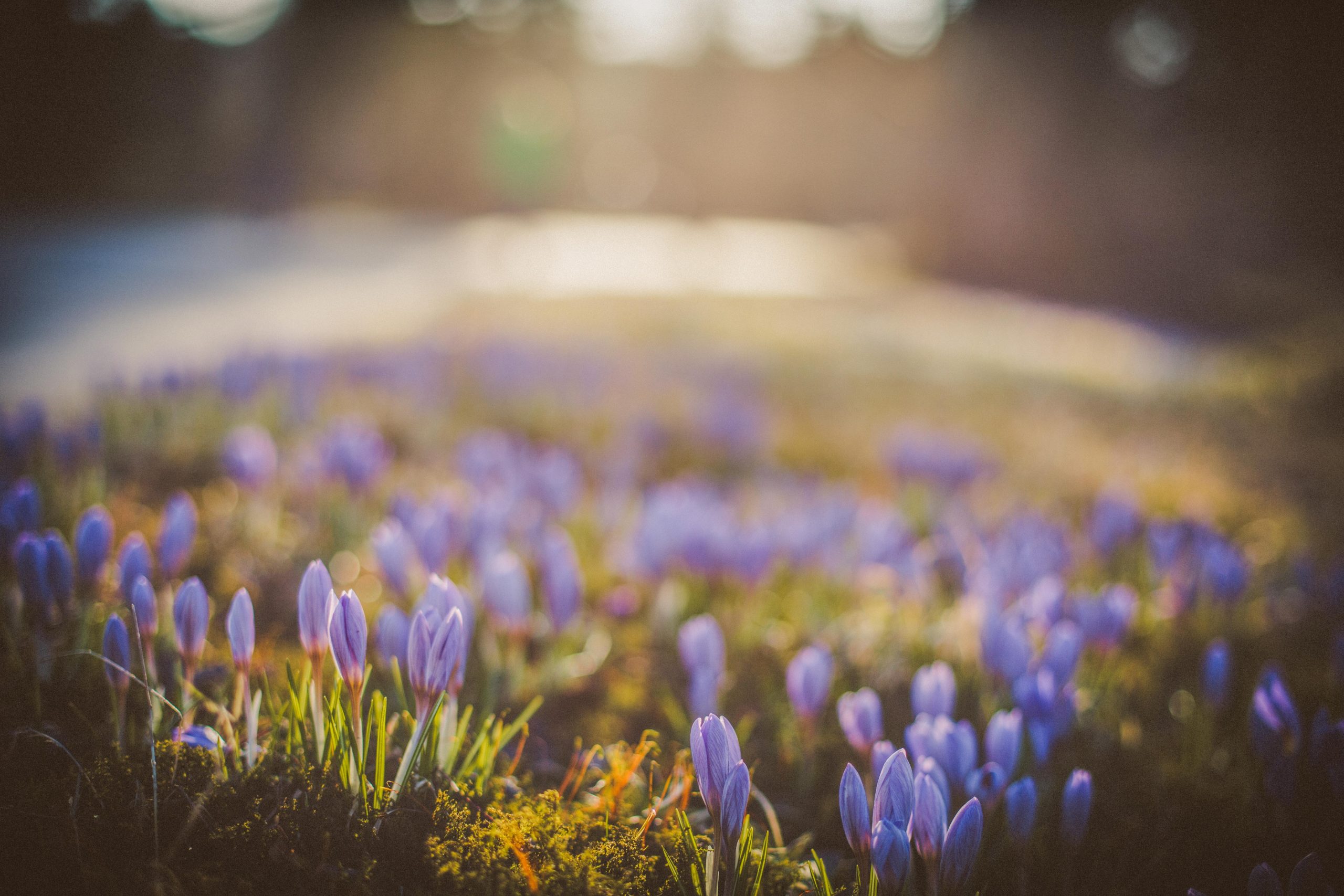And after He had dismissed the crowds, He went up on the mountain by Himself to pray.
When evening came, He was there alone.
~ Matthew 14:23
I pull up and park on the edge of the circular drive, then grab notebooks and a pen. Phone off and technology left behind, I hop out of my car to sprint up the stairs of the chapel of Our Lady of the Holy Cross Abbey. Pulling the glass entryway door open as quietly as I can, I hear the Cistercian monks singing the first Psalm of Lauds. Dipping my finger in the bowl of holy water outside of the chapel’s wooden doors, the best request I could come up with is “God, clear my mind” as I make the sign of the cross on my forehead, then slip through the doors and into a pew with a window view.
Unfortunately, this reflected how I was treating the rest of my day-to-day life and it had exacted a great toll. Living in reaction instead of intention drains us heart and soul. The cacophony of voices demanding attention stoked the internal fires of doubt, envy, sorrow, and ugly isolation. Everything slowly became a battle. I was drowning in mental quicksand, but too busy flailing at life’s demands to take the time to figure out how I ended up in this emotional black hole. Then I heard, “Come to me…and I will give you rest.” (Matt. 11:28, ESV) Of course! I needed silence; I needed to retreat to revisit the solitude of my beloved monastery.
One of my graduate courses focused on the study of postmodern culture. The incredibly difficult themes included atheism, divorce, abortion, and all manner of brokenness, concentrated into an 8-week study. In the first week of class, our professor wisely assigned a radical and redemptive shield to protect our hearts and minds — a one-time, twenty-four hour fast from all media and electronics (including phones) as well as a fifteen-minute daily respite spent sitting in a chair in silence. No books, no sensory input of any kind. Knowing my ENFP, enneagram-7 self as I do, I decided to truly remove myself from temptation and visit the nearby monastery, where I could steep myself in the restorative rhythm of silence and prayer with the Cistercian monks of Holy Cross Abbey, praying The Liturgy of the Hours in a setting of contemplation and silence. Silence. Hours of silence broken only by my petitions and God’s answers. Delicate revelation would replace pressing isolation as heavy layers of my current burdens fell away like heavy snow falling from branches.
“The monastery is a school of the Lord’s service where Christ is formed in the hearts of the brothers and where in solitude and silence they aspire to that interior quiet in which wisdom is born.” (Constitutions of the Order of Cistercians of the Strict Observance 3:2)
Now I sit in the wooden pew, closing my eyes, and soaking in the sweet tenor voices of the monks as they sing Psalm 19. Breathing in, then breathing out, I feel the comforting rhythm that is embedded in all life slowly return to me. Resting and contemplating, that rhythm whispers to us in the turning of the seasons, the movement of the sun across the sky, migration of the birds, and in the rural setting of this abbey, times of planting and harvest. As I watched the eldest monk prepare the table and host for the Eucharist, I noticed that this tradition also had a rhythm that hasn’t changed in more than a millennium. Scripture was recited in a slow and reverent manner, respecting each holy word so that we could receive it fully. The verses in James expressed a richness that I never knew before.
As the monks quietly snuff out the candles and file through the heavy oak doors, I remain in my pew next to the window. Restoration and lightness begin their magic. I tell God that I’m not leaving until He meets me where I am right now, with my pen poised above my notebook. Pages of words, in good order and not, pour onto the pages without interruption. Gazing out of the window, I notice that the trees have a mist of green through their winter-bare branches. Birds warble an invitation to walk through the soft grass, so I leave my books and step outside.
The heavens declare the glory of God,
And the sky above proclaims his handiwork. — Psalm 19:1 (ESV)
My rushed arrival had blinded me to the beauty that lay at my feet at every step! A carpet of crocus flowers, newly bloomed, border the abbey stairs. The sun’s warmth prompts the residents of two beehives to hover around the apiary and over the blossoms, gathering the goodness to restore their honey supply after the cold of winter. Then the air fills with the hammering sound of busy woodpeckers, sweet chirps of nuthatches, and throaty calls of my favorite, the redwing blackbirds. I feel the prickle of tiny burrs attached to my sweater and I remember how I used to gather handfuls of burrs to create little animals. Layers of sound and song and gentle lowing from the cattle, air so clear bearing the fragrance of crisp green and mossy wood, seeing not just brown branches, but every hue of tan and umber in the trees and blue in the sky. My senses are filled because I am still. Nothing competes with this divine conversation. I am at rest, receiving life from the Life Giver.
Turning to walk back to the chapel for the next liturgical prayer, I consider how much life I miss when I am too busy living. I hear, but I do not listen; touch, but not feel; consume, but forget to savor; see, but never gaze; and breathe without sensing. Even prayer can become just another thing to accomplish instead of a communal time with our God who blesses us with a world that fills our senses!
In his Bible Commentary on Matthew 14:23, Matthew Henry tells us to “Observe here, that he [Christ] was alone; he went apart into a solitary place, and was there all alone. Though he had so much work to do with others, yet he chose sometimes to be alone, to set us an example. Those are not Christ’s followers that do not care for being alone; that cannot enjoy themselves in solitude, when they have none else to converse with, none else to enjoy, but God and their own hearts.” Henry’s words carry the firm conviction that solitude is necessary — just God and you.
Find your quiet, holy place that is set apart from the layers of shrill noise of the world. You will hear more in that silence than in a day rife with voices. Expect that the Lord will meet you there to bless, and you will receive His refreshment.
Let the words of my mouth and the meditation of my heart
Be acceptable in your sight,
O Lord, my rock and my redeemer. — Psalm 19:14 (ESV)
The featured image of a carpet of crocus is by Nine Köpfer on Unsplash. We are grateful for her generosity and great eye!
Annie Nardone is a lifelong bibliophile with a special devotion to the Inklings and medieval authors. She is a Fellow with the C.S. Lewis Institute and holds an M.A. in Cultural Apologetics from Houston Christian University. Annie is the Director of Visual Artists for The Cultivating Project and columnist for Cultivating Magazine. She is founding board member, managing editor, and author for the apologetics quarterly, An Unexpected Journal. Her writing can also be found as travel blogger for Clarendon Press U.K., with published poems at Calla Press and Poetica.
She holds a MA in Cultural Apologetics from Houston Christian University, and is a Fellow with the C.S. Lewis Institute. Annie writes for Cultivating, Literary Life, and Clarendon House Books, and is a managing editor and writer for An Unexpected Journal. Annie collaborated on three books in 2022, published by Square Halo Books and The Rabbit Room. She recently designed a curriculum detailing the intersection of theology, the arts, and history and is a Master Teacher for HSLDA. She resides in Florida with her Middle Earth/Narnia/Hogwarts-loving family, and an assemblage of sphynx cats and feline foundlings.
Leave a Reply
A Field Guide to Cultivating ~ Essentials to Cultivating a Whole Life, Rooted in Christ, and Flourishing in Fellowship
Enjoy our gift to you as our Welcome to Cultivating! Discover the purpose of The Cultivating Project, and how you might find a "What, you too?" experience here with this fellowship of makers!


Add a comment
0 Comments